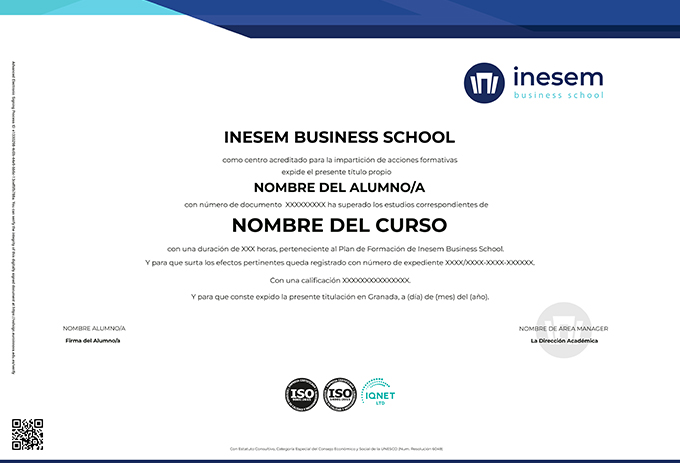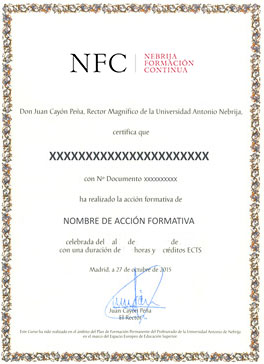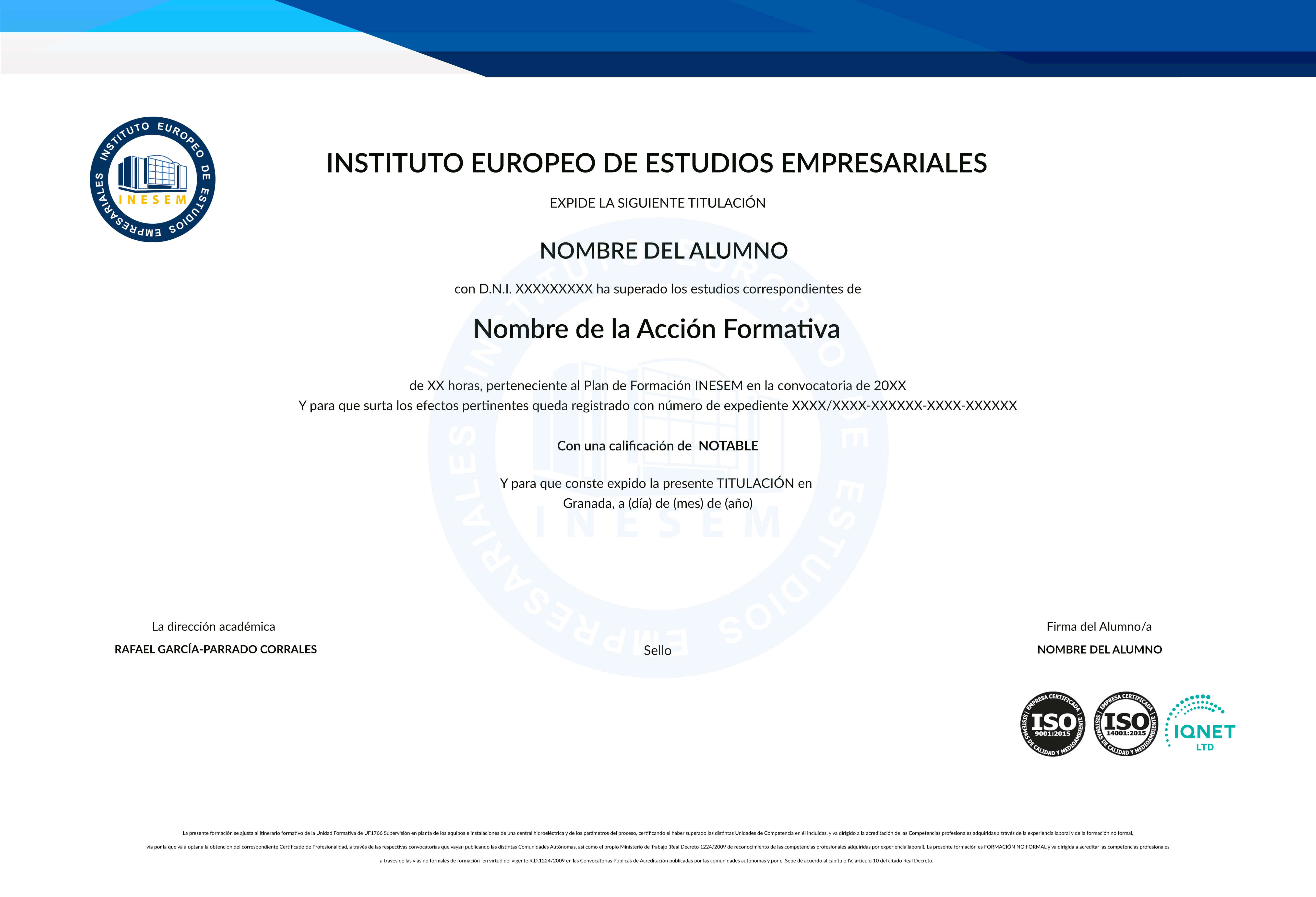
Master Executive en Inglés Profesional (Nivel Oficial Consejo Europeo B2) + 8 Créditos ECTS
Entidad:

SOLICITAR INFORMACIÓN
- Desenvolverse en conversaciones con fluidez y espontaneidad en situaciones en lengua inglesa.
- Escribir textos claros y bien estructurados.
- Comprender las ideas principales y secundarias de textos complejos.
- Mejorar la coherencia y cohesión en el uso del idioma.
- Prepararse para la obtención del título oficial B2.
Profesionales, estudiantes, desempleados y cualquier persona interesada en formarse en el aprendizaje del inglés. No es necesario tener conocimiento del inglés anteriormente, con este Master cualquier persona podrá aprender inglés ya que va abarca desde un nivel básico hasta conseguir una excelente preparación nivel B2.
La metodología INESEM Business School, ha sido diseñada para acercar el aula al alumno dentro de la formación online. De esta forma es tan importante trabajar de forma activa en la plataforma, como necesario el trabajo autónomo de este. El alumno cuenta con una completa acción formativa que incluye además del contenido teórico, objetivos, mapas conceptuales, recuerdas, autoevaluaciones, bibliografía, exámenes, actividades prácticas y recursos en forma de documentos descargables, vídeos, material complementario, normativas, páginas web, etc.
A esta actividad en la plataforma hay que añadir el tiempo asociado a la formación dedicado a horas de estudio. Estos son unos completos libros de acceso ininterrumpido a lo largo de la trayectoria profesional de la persona, no solamente durante la formación. Según nuestra experiencia, gran parte del alumnado prefiere trabajar con ellos de manera alterna con la plataforma, si bien la realización de autoevaluaciones de cada unidad didáctica y evaluación de módulo, solamente se encuentra disponible de forma telemática.
El alumno deberá avanzar a lo largo de las unidades didácticas que constituyen el itinerario formativo, así como realizar las actividades y autoevaluaciones correspondientes. Al final del itinerario encontrará un examen final o exámenes. A fecha fin de la acción formativa el alumno deberá haber visitado al menos el 100 % de los contenidos, haber realizado al menos el 75 % de las actividades de autoevaluación, haber realizado al menos el 75 % de los exámenes propuestos y los tiempos de conexión alcanzados deberán sumar en torno al 75 % de las horas de la teleformación de su acción formativa. Dicho progreso se contabilizará a través de la plataforma virtual y puede ser consultado en cualquier momento.
La titulación será remitida al alumno por correo postal una vez se haya comprobado que ha completado el proceso de aprendizaje satisfactoriamente.
Por último, el alumno contará en todo momento con:
- Listening: Do you know Maria?
- Reading: Describing people
- Speaking: Semivowel sounds
- Writing: An essay
- Vocabulary
- Listening: Winning the lottery
- Reading: What do you usually do?
- Speaking: The schwa
- Writing: A news report
- Vocabulary
- Listening: Where are you going on holiday?
- Reading: Going on holiday to Málaga
- Speaking: Voiced and voiceless consonants
- Writing: A postcard
- Vocabulary
- Listening: Sally's job
- Reading: Getting to know Bill Gates
- Speaking: Sh vs S
- Writing: An invitation
- Vocabulary
- Listening: Nowadays shopping
- Reading: Levi Strauss' life
- Speaking: Sh vs Ch
- Writing: An email
- Vocabulary
- Listening: At the doctor's
- Reading: A doctor's life
- Speaking: The voiceless TH sound
- Writing: A blog post
- Vocabulary
- Listening: People in my family
- Reading: Life in a large family
- Speaking: Final - ed pronunciation
- Writing: E-mails
- Video lesson
- Vocabulary
- Listening: A guided tour
- Reading: Holiday memories
- Speaking: The Schwa Writing: A postcard
- Video lesson
- Vocabulary
- Listening: Music stars
- Reading: Music for health
- Speaking: -tion / -sion suffix pronunciation
- Writing: A story
- Video lesson
- Vocabulary
- Listening: A Thanksgiving celebration
- Reading: Carnival in Notting Hill
- Speaking: Silent letters
- Writing: A short message
- Video lesson
- Vocabulary
- Listening: Intelligen cutlery
- Reading: Young people and social media, a debate
- Speaking: Voiced and unvoiced th /ð /, /θ/
- Writing: For and against essay
- Video lesson
- Vocabulary
- Listening: The cost of studying
- Reading: Consuming the world
- Speaking: -ough group pronunciation
- Writing: A letter
- Video lesson
- Vocabulary
- Listening: Family time
- Reading: Sharing the housework
- Grammar : Present tenses
- Speaking: Unestressed words
- Writing: E-mails
- Vocabulary
- Listening: Where to go?
- Reading: Best holidays ever
- Grammar: Past tenses
- Speaking: Stress in compound words
- Writing: A story
- Vocabulary
- Listening: First day at work
- Reading: Teen jobs
- Grammar: Future tenses
- Speaking: /m/, /n/ and /?/
- Writing: Formal letters
- Vocabulary
- Listening: Rock or drama?
- Reading: Who's got talent?
- Grammar: Conditional sentences
- Speaking: /?/, /j/ and /t?/
- Writing: Essay
- Vocabulary
- Listening: Online or traditional shopping?
- Reading: Harrods
- Grammar: Modal verbs
- Speaking: /a:(r)/ and /ea(r)/
- Writing: A review
- Vocabulary
- Listening: Interview with a guide
- Reading: Eco-friendly houses
- Grammar: Reported speech
- Speaking: /?/, /?/ and /u:/
- Writing: Articles
- Vocabulary
- Listening: At the careers service
- Reading: Jobs advertisements
- Grammar review: Present tenses
- Speaking: Introducing yourself
- Writing: A CV
- Vocabulary
- Listening: A job interview
- Reading: Job swap
- Grammar review: Past tenses
- Speaking: Talking about your previous experience
- Writing: A cover letter
- Vocabulary
- Listening: Welcome to the office
- Reading: How to communicate our ideas at the office
- Grammar review: Future
- Speaking: Promoting your company
- Writing: A business report
- Vocabulary
- Listening: Setting an appointment
- Reading: Persuasion in business communication
- Grammar review: Comparative and superlative forms of adjectives
- Speaking: A formal conversation or meeting
- Writing: An email asking for a meeting
- Vocabulary
- Listening: A good meeting
- Reading: Negotiating
- Grammar review: Conditional
- Speaking: How to be an active participant in meetings
- Writing: A meeting minutes
- Vocabulary
- Listening: Placing an order
- Reading: Complaints
- Grammar review: Modal verbs for the present and the future
- Speaking: How to interrupt politely
- Writing: An email offering an apology
- Vocabulary
- Listening: Presenting your idea to investors
- Reading: Pieces of advice for entrepreneurs
- Grammar review: Modal verbs for the past
- Speaking: Product presentation
- Writing: A letter of enquiry
- Vocabulary
- Listening: International business
- Reading: Challenges and opportunities of multiculturalism
- Grammar review: Verbs followed by infinitive or gerund
- Speaking: Where would you like to work abroad?
- Writing: A recommendation letter
- Vocabulary
- Listening: Arranging a business trip
- Reading: Top business destinations
- Grammar review: The passive
- Speaking: Dealing with problems
- Writing: A review
- Vocabulary
- Listening: What's a green business?
- Reading: Suitable business
- Grammar review: Causative have
- Speaking: Suggestions
- Writing: A proposal
- Vocabulary
- Listening: The rise of E-commerce
- Reading: Electronic payment
- Grammar review: Relative clauses
- Speaking: A presentation
- Writing: An email dealing with a refund request
- Vocabulary
- Listening: Talking with the colleagues at the office
- Reading: Some team building activities
- Grammar review: Reported speech
- Speaking: Small talk
- Writing: An invitation to a social event
- Vocabulary
Doble titulación:
- Título Propio Master Executive en Inglés Profesional (Nivel Oficial Consejo Europeo B2) expedido por el Instituto Europeo de Estudios Empresariales (INESEM). “Enseñanza no oficial y no conducente a la obtención de un título con carácter oficial o certificado de profesionalidad.”
- Título Propio Universitario de Preparación en B1 Inglés expedido por la Universidad Antonio de Nebrija con 8 créditos ECTS



- Estar trabajando para una empresa privada.
- Encontrarse cotizando en el Régimen General de la Seguridad Social
- Que el curso seleccionado esté relacionado con el puesto de trabajo o actividad principal de la empresa.
- Que la empresa autorice la formación programada
- Que la empresa disponga de suficiente crédito formativo para cubrir el coste del curso

